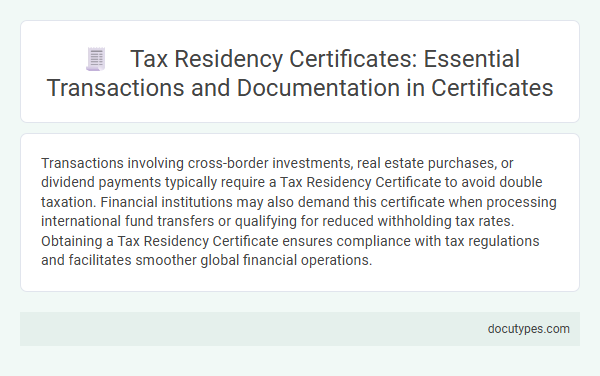Transactions involving cross-border investments, real estate purchases, or dividend payments typically require a Tax Residency Certificate to avoid double taxation. Financial institutions may also demand this certificate when processing international fund transfers or qualifying for reduced withholding tax rates. Obtaining a Tax Residency Certificate ensures compliance with tax regulations and facilitates smoother global financial operations.
Understanding Tax Residency Certificates
Understanding Tax Residency Certificates is essential for identifying which transactions require one. These certificates verify your tax residency status, helping to avoid double taxation on cross-border payments. Transactions such as claiming treaty benefits, foreign income reporting, and certain financial dealings often require a valid Tax Residency Certificate.
Importance of Tax Residency Certificates in International Transactions
Tax residency certificates are essential for many international transactions to verify your tax status and avoid double taxation. These certificates establish your residency for tax purposes, facilitating smoother cross-border financial dealings.
- Cross-border investments - Tax residency certificates confirm your eligibility for tax treaty benefits, reducing withholding taxes on dividends, interest, and royalties.
- International business contracts - Companies require tax residency proof to apply appropriate withholding tax rates and comply with tax regulations in cross-border agreements.
- Foreign income reporting - Tax residency certificates assist in declaring foreign income accurately and claiming tax credits in your resident country.
Key Criteria for Obtaining a Tax Residency Certificate
Transactions involving cross-border tax obligations commonly require a Tax Residency Certificate (TRC). This certificate verifies an individual's or entity's tax residency status to ensure appropriate tax treatment under double taxation agreements.
Key criteria for obtaining a TRC include proof of residency in the issuing country for a specified period. Applicants must provide valid identification, proof of income sources, and documentation proving tax compliance within the jurisdiction.
Required Documentation for Tax Residency Applications
Tax residency certificates are crucial for specific financial transactions subject to cross-border taxation rules. Understanding the required documentation ensures smooth processing of tax residency applications.
- Real Estate Transactions - A tax residency certificate is mandatory to claim tax treaty benefits on property sales or purchases abroad.
- Dividend and Interest Payments - Financial institutions require a certificate to apply reduced withholding tax rates under international agreements.
- Business Income Reporting - Companies must submit a tax residency certificate to prove their tax status while filing tax returns in foreign jurisdictions.
Providing accurate identification, proof of residence, and previous tax returns is essential to obtain a tax residency certificate.
Step-by-Step Process to Apply for a Tax Residency Certificate
Tax residency certificates are essential for transactions involving cross-border taxation to avoid double taxation. These certificates confirm an individual or entity's tax residency status in a particular country.
- Determine Eligibility - Verify if the transaction requires a tax residency certificate, typically for foreign income, investment, or trade activities.
- Gather Required Documents - Collect identification, proof of residency, income statements, and prior tax returns as needed for application.
- Submit Application - Complete and submit the tax residency certificate application through the relevant tax authority's official online portal or office.
Common Transactions Requiring Tax Residency Certificates
Tax residency certificates are essential for verifying an individual's or entity's tax status in a particular country. These certificates help avoid double taxation and ensure compliance with tax treaties.
Common transactions requiring a tax residency certificate include claiming treaty benefits on dividends, interest, and royalty payments. Financial institutions and tax authorities often demand these certificates during cross-border transactions to validate tax residency claims.
Validity and Renewal of Tax Residency Certificates
Which transactions require a Tax Residency Certificate for validation? A Tax Residency Certificate is essential for international transactions to avoid double taxation and claim tax treaty benefits. Its validity usually spans one year from the date of issue, ensuring compliance during the fiscal period.
How important is the renewal of a Tax Residency Certificate for ongoing transactions? Renewal is mandatory to maintain uninterrupted tax benefits and avoid penalties, as expired certificates lose their legal standing. You should apply for renewal before expiration to secure continued proof of tax residency.
Legal Implications of Tax Residency Certificates
Tax residency certificates are required for transactions involving cross-border income to avoid double taxation and comply with international tax treaties. These certificates serve as proof of an individual's or entity's tax residency status in a specific jurisdiction.
Legal implications of tax residency certificates include eligibility for reduced withholding tax rates and protection against tax disputes. Failure to provide a valid certificate can lead to higher tax withholding or penalties under local tax laws. Tax residency certificates must be issued by authorized tax authorities and accurately reflect the relevant tax period to ensure compliance.
Challenges in Securing Tax Residency Certificates
| Transaction Type | Requirement for Tax Residency Certificate | Challenges in Securing Tax Residency Certificates |
|---|---|---|
| Cross-border Investments | Mandatory to claim treaty benefits and avoid double taxation | Complex documentation proving residency; long processing times; varying criteria across jurisdictions |
| Dividends and Interest Payments | Required to apply reduced withholding tax rates under bilateral tax treaties | Difficulties in meeting stringent residency proof standards; inconsistencies in certificate formats |
| Capital Gains Transactions | Essential for confirming tax obligations and eligibility for treaty exemptions | Delays in certificate issuance; challenge in verifying status for entities with multiple residences |
| Royalty Payments | Needed to benefit from preferential tax rates under international agreements | Varied application procedures; uncertainties in document acceptance; presence of anti-abuse provisions |
| Service Fees and Management Charges | Often necessary to reduce withholding tax and validate taxpayer status | Challenges in maintaining updated certificates; administrative burdens; limited awareness of requirements |
Which Transactions Require a Tax Residency Certificate? Infographic

